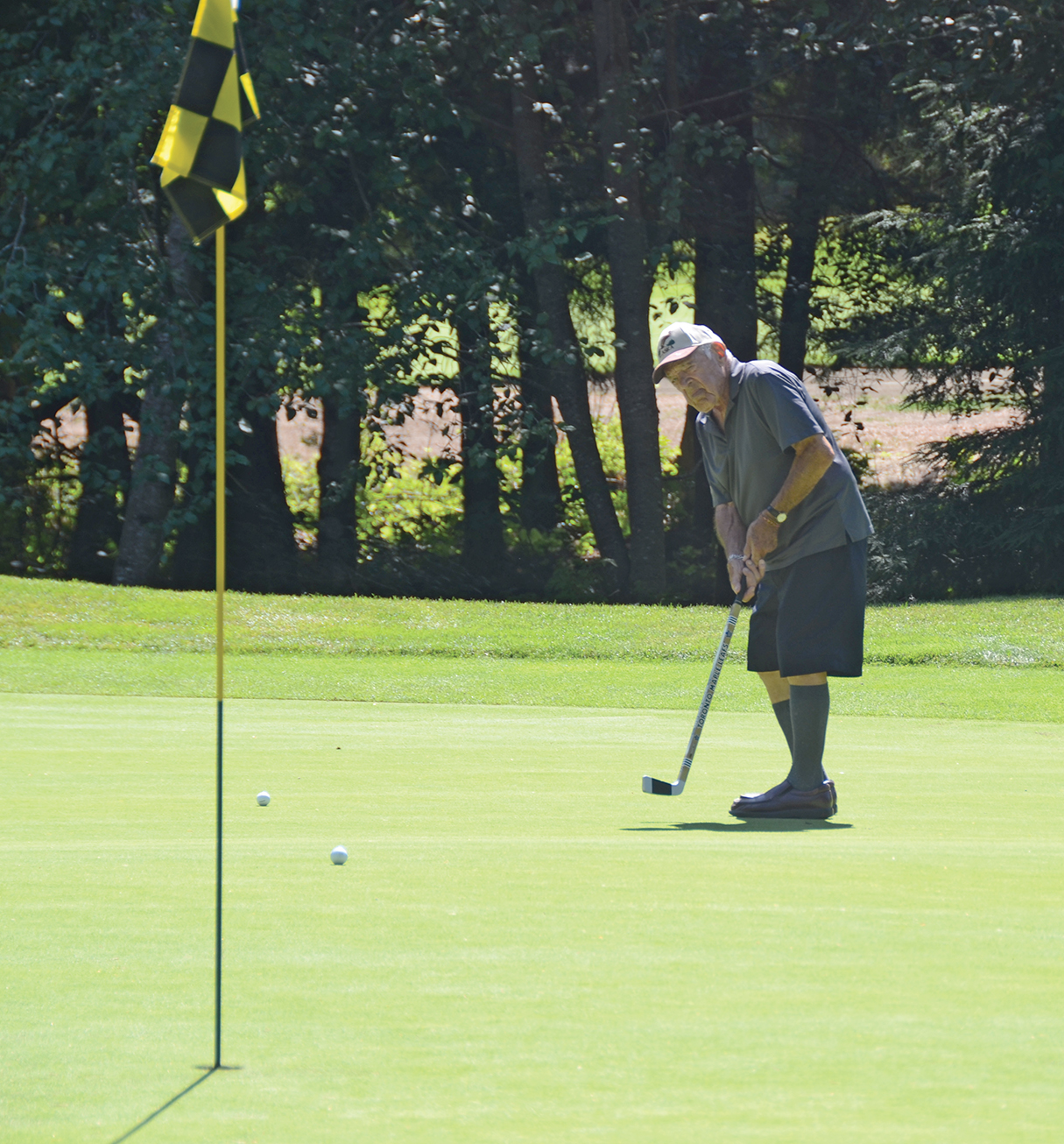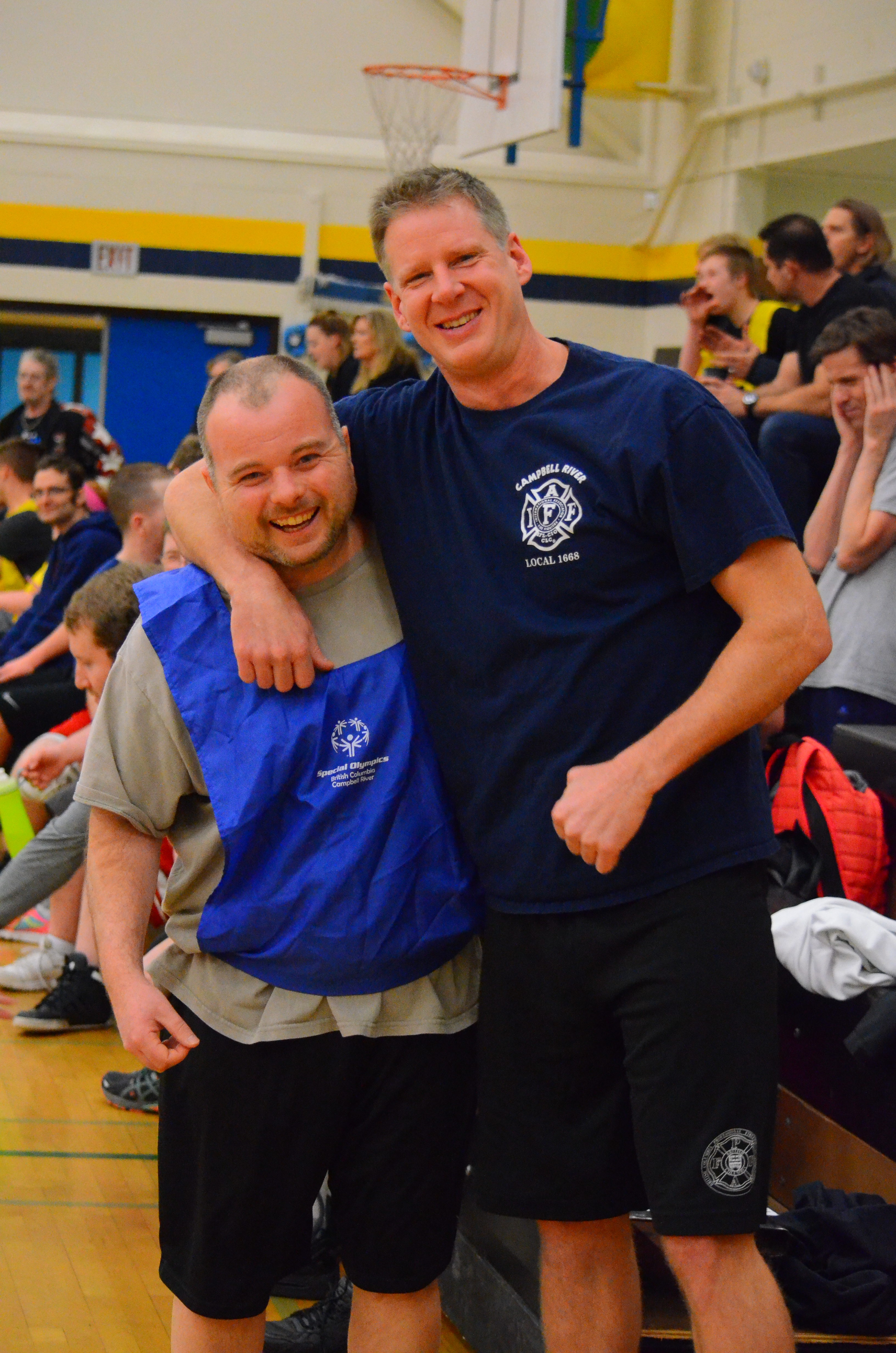The support Campbell River provides Special Olympics athletes opens them to a world of fun, fitness, camaraderie and travel and the benefits those things afford.
The biggest method of supporting Special Olympics in Campbell River is through support of the annual Howie Meeker Special Olympics Golf Classic which will be held August 20 at Storey Creek Golf Course. The event is the local chapter of Special Olympics’ most important fundraiser. Without this event, Special Olympics doesn’t happen in Campbell River and that means a lot of individuals with special needs lose the benefits gained from participating in sports.
“It’s just so amazing,” said Terri Cranton, co-chair of the golf classic organizing committee. “Just to think they can go and just be like everybody.”
Campbell River Special Olympics supports 130 athletes in more than 16 programs. It pays for the travel to competitions near and far. Athletes compete locally against community organizations that support the various sports. For example, Campbell River firefighters come to provide competition for Special Olympics soccer and basketball, giving the athletes the experience that only competing provides. This prepares them to compete against other Special Olympics athletes in regional, provincial, national and even international competitions. Last year Campbell River Special Olympian Michelle Forberg was part of the first-ever Canadian basketball team to compete at a Special Olympics World Games. She and her team qualified through their gold-medal performance at the Special Olympics Canada 2014 Summer Games in Vancouver.
Snowshoer Hazen Meade travelled to Newfoundland in March to compete in the Special Olympics National Winter Games. He has also travelled to Seoul, South Korea in 2013 to compete in the Special Olympics World Winter Games.
It’s opportunities like that that Special Olympics provides the athletes. Other opportunities include travel around Vancouver Island and B.C. for competitions. But the benefits of just playing and making and meeting friends contributes to the immensely positive experience derived from Special Olympics.
Campbell River Special Olympians are particularly fortunate because the local chapter is a proactive organization that is among the best in the province, if not the country, in delivering athletic programs.
The local organization and the local volunteers of the Howie Meeker Golf Classic make it happen. They have to, said Cranton, the mother of a Special Olympian.
“It just doesn’t happen otherwise,” she said. “It’s just not the way of the world. Sometimes you have got to make it happen.”
The results are overwhelmingly positive, which helps keep volunteers and families of athletes going.
“It’s just a very worthwhile place to be,” Cranton said. “It’s very rewarding.”
This year will be th 28th annual Howie Meeker Special Olympics Golf Classic. And it’s been associated with former NHL All-Star and Hall of Fame broadcaster, Howie Meeker, that whole time.
Now in his 90s, Meeker has surpassed a quarter century of involvement with the tournament. The job was initially supposed to go to someone else.
“The fellas that started the golf classic had a special meeting,” Meeker, 92, told Campbell River Mirror reporter J.R. Rardon. “I was invited to it, maybe because I had some contacts to maybe get some players from the Canucks to put their name to it.”
But Meeker, who was then announcing Vancouver Canucks games for BCTV, was unable to recruit any of the Canucks, who claimed “they were all busy in August.”
Even a desperation attempt to recruit a player or two from the Toronto Maple Leafs, the franchise Meeker helped win four Stanley Cups and later coached, left him empty-handed.
“About then, somebody came up with the idea we call it the Howie Meeker Classic. They got to the bottom of the barrel and were left with Howie Meeker,” he said with a cackle familiar to viewers of his broadcasts on BCTV and, before that, on Hockey Night in Canada.
It is a decision neither Meeker nor classic organizers have regretted. For the classic’s first 10 years, he and his wife Grace traveled each year to Campbell River, where he greeted each player and took a tee shot for each foursome at Storey Creek’s signature 17th hole.
After he lost Grace to cancer he remarried, and now brings his second wife, Leah.
“It’s something we’ve always looked forward to,” Meeker said. “And it’s been an honour coming back every year. The event itself if really fun, and it’s for one of the best reasons in the world.
“If you’ve got a dollar you want to put on something, Special Olympics is as good as it gets.”
Despite his age and failing vigor — Meeker is the last surviving member of the Maple Leafs’ 1947 Stanley Cup-winning team — he will remain a part of the classic as long as he can make the trip up from Parksville.
He will always have a special place in his heart for the “original” Howie Meeker Classic and the athletes it was created to benefit.
“The good Lord may have shortchanged them in some ways, but He more than made up for it in a lot of others,” Meeker said. “I’ve been there 27 years and it’s all first-name basis. I’ve watched some of them grow up and some of them turn gray.
“But there comes a time when it’s payback time, and if there’s something I can do to help out, I’m glad to do it. I can’t do enough for ‘em.”
Many individuals and businesses in town agree with Meeker as they throw their support behind the event.
“We have amazing major sponsors,” Cranton said.
This year, Broadstreet Properties has come on as a major sponsor of the event. Other sponsors include Cermaq, Bailey Western Star, Wacor, realtors Amy Ross and Paul Axon, the Campbell River Mirror, 2day FM, Hub International, Marine Harvest, Grieg Seafood, Thrifty Foods and Sure Copy.
And it all leads to great success. Last year’s tournament raised $38,000.
“That was a good year,” Cranton said. “We were very happy.”
The money goes a long way to allowing Campbell River Special Olympics to focus on delivering programs rather than ongoing fundraising. It also allows the local organization to keep the cost down to the athletes.
“That’s why we fundraise, it keeps the costs down for the athletes,” Cranton said.
Campbell River’s athletes pay the least to participate of any Special Olympics athletes on Vancouver Island.
“And we take them to way more stuff. They travel further they experience more than other locals because of this funding,” Cranton said. “Our athletes and our people really do benefit from it. That’s who benefits from it. It stays local none of it goes to any other cost except our athletes.”
The program is run completely by volunteers. The golf classic committee has 10 volunteers and all the coaches for the programs are volunteers as well – more than 30.
The golf classic starts with a Texas Scramble at 10 a.m. They play and there is food and prizes and a hole-in-one tournament. Rides are provided to the Thunderbird Hall where a dinner, awards and silent auction is provided (with rides home provided as well).
The athletes serve as caddies for every team of golfers during the tournament and then they attend the dinner and auction.
All the fun happens on Aug. 20 at Storey Creek Golf Course and supporting this event goes a long way towards making Special Olympics happen in Campbell River.
– with files from J.R. Rardon
ORIGINS
The Special Olympics movement was founded in 1968 by Eunice Kennedy Shriver and has grown to include nearly 4.5 million athletes in 229 accredited programs in 170 countries, including Canada.
 The first Special Olympics competition was held in Chicago in 1968 and included athletes from 26 U.S. states and from Canada.
The first Special Olympics competition was held in Chicago in 1968 and included athletes from 26 U.S. states and from Canada.
On June 9, 1969, in Toronto, Ontario, Canada’s first Special Olympics national competition was held, less than one year after the sport movement was born on Chicago’s Soldier Field. It attracted 1,400 individuals with an intellectual disability from towns and cities across the country to compete in athletics, aquatics, and floor hockey.
Canadian broadcast legend, Harry “Red” Foster, an advertising executive and philanthropist, was inspired by what he had seen in Chicago, Illinois, in 1968. Foster caught the vision and worked tirelessly to bring the sport movement to this country.
For more than 40 years, Special Olympics Canada has delivered one message to Canadians: people with an intellectual disability can and will succeed in life if given the opportunity.
Special Olympics Canada’s website says, “The roots of the movement go back to the early 1960s, when a group of students at Beverley School, an inner-city school in Toronto, Ontario, became the test group for Dr. Frank Hayden, a sport scientist at the University of Toronto. Dr. Hayden was studying the effects of regular exercise on the fitness levels of children with an intellectual disability.
“Dr. Hayden’s research was nothing short of groundbreaking. It challenged the prevailing mindset of the day – one that claimed that it was the disability itself that prevented them from fully participating in play and recreation. Through rigorous scientific method, Dr. Hayden proved that it was simply the lack of opportunity to participate that caused their fitness levels to suffer. Given the opportunity, people with an intellectual disability could acquire the necessary skills to participate in sport, and become physically fit. Sport could have a transformative effect on the lives of those with an intellectual disability.”